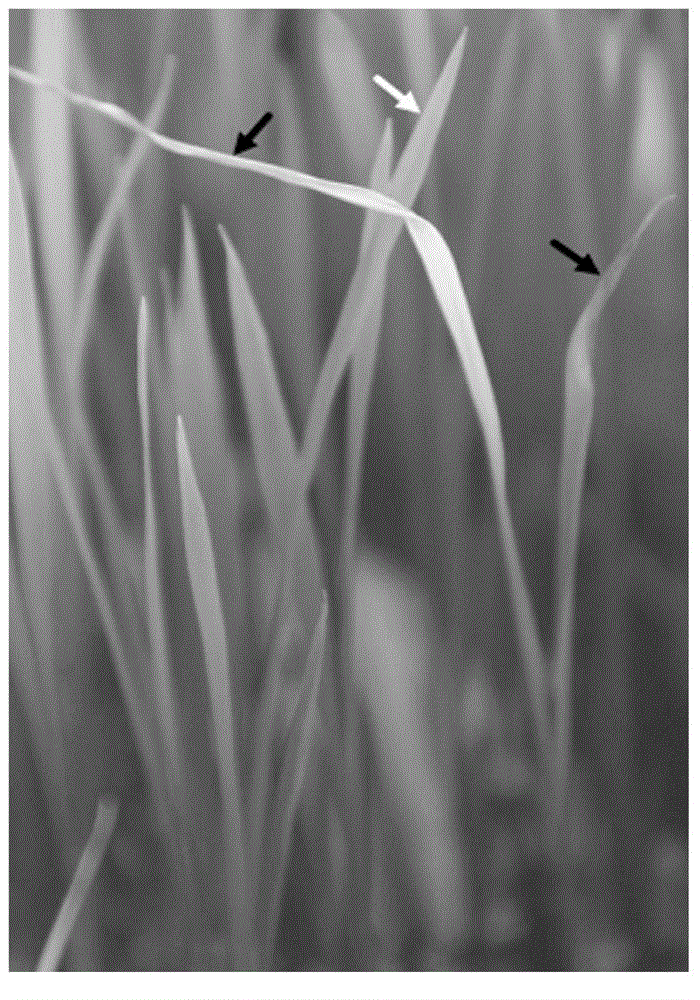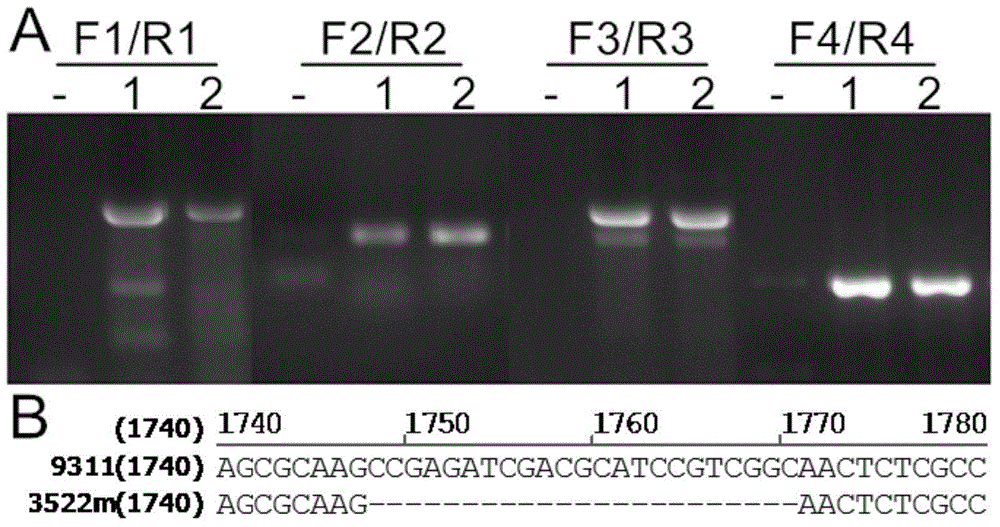Rice CYP81A6 gene mutant CYP81A6-m2 and application thereof
A CYP81A6 and cyp81a6-m2 technology, applied in the field of genetic engineering, can solve the problems of loss of biochemical functions, inability to detect, difficult molecular marker assisted breeding, etc., and achieve obvious screening effect and huge economic value
- Summary
- Abstract
- Description
- Claims
- Application Information
AI Technical Summary
Problems solved by technology
Method used
Image
Examples
Embodiment 1
[0038] Example 1 Screening of rice mutants sensitive to bentazone
[0039] 1. Cobalt 60 Radiation Mutation Mutant Library and M1, M2 Generation Planting and Character Observation
[0040] In the summer of 2013 in Changsha via cobalt 60 Irradiate 10 kg of 93-11 seeds and plant them in the Lingao field in Hainan in summer. This is the M1 generation. The M1 generation seeds are harvested by individual plants, and a total of about 4557 seeds are harvested. 3617 lines of M1 generation seeds were selected, and 50 individual plants were planted for each line. They were planted in the Lingao field in Hainan in the spring of 2014. This is the M2 generation. After transplanting, carefully observe the field traits at the tillering stage, booting stage, heading stage, flowering stage, and filling stage, and screen various types of mutants such as plant type, panicle type, fertility, and yield. A single plant was harvested and stored as a special mutant; 6 individual plants were harvest...
Embodiment 2
[0043] Example 2 Determination of Rice CYP81A6 Gene Mutant CYP81A6-m2
[0044] After confirming bentazone-sensitive mutants, get 3522m leaves, extract DNA, and design primers covering the full length of the gene (SEQ ID NO.2-3, SEQ ID NO.4-5, SEQ ID NO.6-7 and SEQ ID NO. NO.8-9), perform PCR amplification and sequence the product. DNA extraction is carried out as follows: Take 3522m rice leaves about 2cm long and put them in a 2ml centrifuge tube; add 800μl 1.5×CTAB to the mortar, grind the leaves until homogenized and pour them back into the centrifuge tube; 65℃ water bath for 20-30min , and mix once every 5 minutes; add an equal volume of chloroform / isoamyl alcohol (24:1), mix up and down for 10 minutes; Double the volume of ice-cooled 95% ethanol, place on ice at -20°C for 20 minutes; centrifuge at 12,000 rpm for 15 minutes; discard the supernatant, add 500 μl of 75% ethanol, rinse upside down, and centrifuge at 12,000 rpm for 5 minutes; discard the supernatant, and place ...
Embodiment 3
[0050] Example 3 Screening for detection of CYP81A6-m2 molecular markers
[0051] After the DNA mutation site of 3522m was identified by sequencing, a co-dominant primer marker was designed around this site for molecular marker-assisted selection breeding. The PCR amplification conditions were the same as in Example 2, and the amplified products were detected by agarose electrophoresis and polyacrylamide (PAGE) electrophoresis respectively. The result is as Figure 5 and Figure 6 shown. 2% agarose electrophoresis results showed ( Figure 5 Figure A), the primer pair BM1, BM3, and BM4 amplified a single target fragment with clear bands, which can be used as molecular markers for subsequent molecular marker-assisted selection breeding to distinguish wild-type CYP81A6 and mutant CYP81A6-m2; 6% PAGE electrophoresis results show( Figure 5 Figure B), the primer pair BM1-BM4 can be used as a molecular marker for subsequent assisted selection breeding to distinguish wild-type C...
PUM
 Login to View More
Login to View More Abstract
Description
Claims
Application Information
 Login to View More
Login to View More - R&D
- Intellectual Property
- Life Sciences
- Materials
- Tech Scout
- Unparalleled Data Quality
- Higher Quality Content
- 60% Fewer Hallucinations
Browse by: Latest US Patents, China's latest patents, Technical Efficacy Thesaurus, Application Domain, Technology Topic, Popular Technical Reports.
© 2025 PatSnap. All rights reserved.Legal|Privacy policy|Modern Slavery Act Transparency Statement|Sitemap|About US| Contact US: help@patsnap.com



